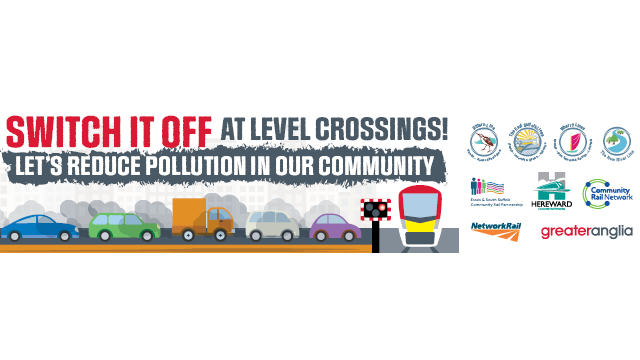
Communities living near level crossings in East Anglia will join with rail organisations to remind drivers to switch their engines off when waiting in a bid to reduce pollution.
Following a flurry of complaints, Greater Anglia, Network Rail, the Community Rail Network and the region’s six community rail partnerships will launch a campaign on Clean Air Day, 17 June, asking people to ‘Switch it off’ at level crossings.
The campaign will see the organisations taking to social media and working with communities to raise awareness locally with posters and car window stickers funded by Community Rail Network.
They will be supported by Greater Anglia’s team of 260 volunteer station adopters, many of whom have noticed the problem of unpleasant exhaust fume pollution and noise caused by cars idling at level crossings in their own communities.
An idling engine can produce up to twice the emissions of a car in motion, churning out sulphur dioxide, particulate matter and nitrogen oxide. All of these are thought to contribute to asthma, heart disease and even lung cancer and have a negative effect on the environment by contributing to poor air quality.
There are over 800 level crossings in East Anglia which are used by thousands of vehicles every day.
Just one car idling at a level crossing could fill up to150 balloons per minute with exhaust fumes.
Frank Belgrove, who volunteers at Alresford rail station as part of Greater Anglia’s Station Adoption initiative, said, “When you get a queue of cars and they are all running their engines on a small street surrounded by houses, it is extremely unpleasant in terms of the nasty fumes and the noise. It would be wonderful if people could take note of the campaign and be more considerate of those around them when they are sitting in traffic. It may not seem worth switching off the engine just for a few seconds, but to those of us who live here, I can assure them it really would make a huge difference and we would be so grateful.”
Ellie Burrows, Network Rail’s route director for Anglia, said: “We know that air pollution is a concern for residents living near our level crossings because they’ve contacted us about it.
“I’m really pleased that we’re working together with Greater Anglia and the rail partnerships to combat this issue and improve the lives of those who live near our crossings.
“We want to help motorists understand the impact they have and that simply turning off their engine while waiting can hugely improve air quality for those who live nearby.”
Jayne Sumner, of Essex and South Suffolk Community Rail Partnership said, “The Royal College of Physicians estimates that 40,000 deaths a year in the UK are linked to air pollution, with engine idling contributing to this.
“By working together and raising awareness of this problem I hope that we can all be a part of creating healthier communities and cleaner spaces for our region.”
Greater Anglia’s managing director, Jamie Burles, said, “We are working really hard to become ever more sustainable – cutting our CO2 emissions by 11% in 2019 in addition to already being the most environmentally friendly form of transport after cycling and walking – and signing up to the Department for Transport’s Sustainable Stations pledge.
“But when our volunteers came to us asking for help with issues caused at level crossings, we knew we could go further and were only to happy to join with Network Rail, the Community Rail Network and our community rail partnerships to support them in raising awareness of this problem.”
“I hope they will see improvements as a result and hope that everyone who uses level crossings in the region will take note and get behind the campaign.”
Community Rail Network chief executive, Jools Townsend said: “We should all be working hard to reduce our air pollution, so we are delighted to be able to support this valuable campaign with Greater Anglia, Network Rail and our community rail groups in East Anglia. The community rail movement has an important part to play in influencing and educating their communities as we build back to a greener more sustainable future.”
